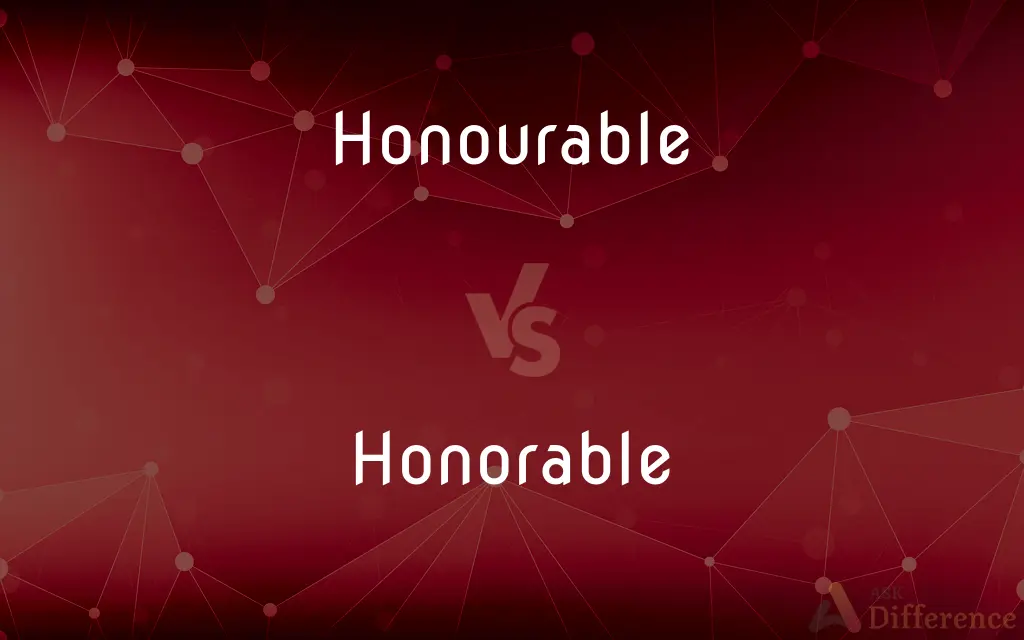Honourable vs. Honorable — What's the Difference?
By Maham Liaqat & Urooj Arif — Updated on March 21, 2024
"Honourable" is the British spelling, implying respectability and integrity. "Honorable" is the American variant, carrying the same connotations.

Difference Between Honourable and Honorable
Table of Contents
ADVERTISEMENT
Key Differences
"Honourable" is the preferred spelling in British English, used to describe someone deserving honor due to their high moral standards and conduct. Whereas "honorable" follows American English conventions, holding the same meaning and used in similar contexts.
In legislative titles and formal addresses, "The Honourable" is commonly used in Commonwealth countries to denote members of parliament, judges, and certain officials. On the other hand, "The Honorable" is used in the United States for officials like congressmen, judges, and public servants, reflecting the American spelling.
The use of "honourable" often appears in legal documents, formal invitations, and ceremonial contexts within the UK and its Commonwealth realms, emphasizing tradition and formality. Conversely, "honorable" is prevalent in similar American contexts, aligning with the US's spelling norms and linguistic practices.
Despite the spelling differences, both "honourable" and "honorable" carry the same implications of respect, integrity, and ethical behavior. The choice between them largely depends on the country's spelling standards and the audience's familiarity with either form.
The distinction between "honourable" and "honorable" also serves as an example of the broader differences between British and American English, which include variations in spelling, vocabulary, and sometimes syntax, but typically not in the fundamental meanings of words.
ADVERTISEMENT
Comparison Chart
Spelling
"ou" is used, reflecting traditional British spelling
"o" is used, aligning with American spelling conventions
Usage in Formal Titles
Common in Commonwealth countries for MPs, judges, etc.
Used in the United States for congressmen, judges, and other officials
Contexts
Legal documents, formal events, and addresses in the UK and its realms
Similar contexts in the United States, adhering to American English norms
Connotations
Implies respectability, integrity, and high moral standards
Carries the same connotations of respect and ethical behavior
Linguistic Variation
Part of a broader set of spelling differences between British and American English
Reflects American English spelling simplifications and differences
Compare with Definitions
Honourable
British English spelling for respectability.
He was given the title The Honourable for his service.
Honorable
American English spelling denoting integrity.
The title The Honorable is often bestowed upon American judges.
Honourable
Used in formal addresses and titles.
The Honourable Jane Smith, MP, spoke at the event.
Honorable
Used in US formal titles and documents.
The Honorable John Doe, Senator from California, was re-elected.
Honourable
Common in Commonwealth countries.
In Commonwealth realms, The Honourable is a common prefix for judges.
Honorable
Prevalent in American contexts.
In the United States, The Honorable is used for many public servants.
Honourable
Reflects traditional British spelling.
The term honourable aligns with the British spelling of words like colour and favour.
Honorable
Part of American spelling conventions.
Honorable reflects the American approach to simplifying spellings, similar to color and flavor.
Honourable
Implies high moral standards and conduct.
His honourable actions earned him widespread respect.
Honorable
Signifies respect and ethical behavior.
Her honorable dealings in business set a standard for others.
Honourable
Bringing or deserving honour
A decent and honourable man
This is the only honourable course
Honorable
Deserving or winning honor and respect
Led an honorable life.
Honourable
Used as a title for certain high officials, the children of certain ranks of the nobility, and MPs
The Honourable Alan Simpson, US Senator
Honorable
Bringing distinction or recognition
Honorable service to one's nation.
Honourable
Standard spelling of honorable
Honorable
Possessing and characterized by honor
An honorable person.
Honourable
Standard spelling of honorable
Honorable
Consistent with honor or good name
Followed the only honorable course of action.
Honourable
Showing or characterized by honor and integrity;
An honorable man
Led an honorable life
Honorable service to his country
Honorable
Distinguished; illustrious
This honorable gathering of scholars.
Honourable
Used as a title of respect;
My honorable colleague
Our worthy commanding officer
Honorable
Attended by marks of recognition and honor
Received an honorable burial.
Honourable
Adhering to ethical and moral principles;
It seems ethical and right
Followed the only honorable course of action
Had the moral courage to stand alone
Honorable
Used as a title of respect for certain high government officials
The Honorable Jane Doe, Associate Justice of the Supreme Judicial Court of Massachusetts.
Honorable
Used as a courtesy title for the children of barons and viscounts and the younger sons of earls.
Honorable
Used in the House of Commons as a title of respect when speaking of another member.
Honorable
Worthy of respect; respectable.
Honorable
(politics) A courtesy title, given in Britain and the Commonwealth to a cabinet minister, minister of state, or senator, and in the United States to the president, vice president, congresspeople, state governors and legislators, and mayors.
Honorable
A politician or other person who bears the title of "honorable".
Honorable
Worthy of honor; fit to be esteemed or regarded; estimable; illustrious.
Thy name and honorable family.
Honorable
High-minded; actuated by principles of honor, or a scrupulous regard to probity, rectitude, or reputation.
Honorable
Proceeding from an upright and laudable cause, or directed to a just and proper end; not base; irreproachable; fair; as, an honorable motive.
Is this proceeding just and honorable?
Honorable
Conferring honor, or produced by noble deeds.
Honorable wounds from battle brought.
Honorable
Worthy of respect; regarded with esteem; to be commended; consistent with honor or rectitude.
Marriage is honorable in all.
Honorable
Performed or accompanied with marks of honor, or with testimonies of esteem; as, an honorable burial.
Honorable
Of reputable association or use; respectable.
Let her descend: my chambers are honorable.
Honorable
An epithet of respect or distinction; as, the honorable Senate; the honorable gentleman.
Honorable
Not disposed to cheat or defraud; not deceptive or fraudulent;
Honest lawyers
Honest reporting
An honest wage
Honest weight
Honorable
Showing or characterized by honor and integrity;
An honorable man
Led an honorable life
Honorable service to his country
Honorable
Used as a title of respect;
My honorable colleague
Our worthy commanding officer
Honorable
Adhering to ethical and moral principles;
It seems ethical and right
Followed the only honorable course of action
Had the moral courage to stand alone
Honorable
Deserving of esteem and respect;
All respectable companies give guarantees
Ruined the family's good name
Common Curiosities
Can 'honourable' and 'honorable' be used interchangeably?
They can be used interchangeably in terms of meaning, but the choice of spelling should align with the targeted variant of English.
Is 'honorable' used in official titles in the US?
Yes, "The Honorable" is used in the United States as a formal title for officials like congressmen and judges.
What is the difference between 'honourable' and 'honorable'?
The primary difference is the spelling: "honourable" is British English, while "honorable" is American English.
What does it mean to be called 'The Honourable'?
Being called "The Honourable" is a formal title of respect, often used for members of parliament, judges, and certain officials.
Can 'honourable' be used in non-legal contexts?
Yes, "honourable" can describe anyone or any action that demonstrates high moral standards, not just in legal contexts.
Why does British English use 'ou' in 'honourable'?
The "ou" spelling in words like "honourable" reflects traditional British English, influenced by French and Latin spellings.
Do 'honourable' and 'honorable' have the same meaning?
Yes, both spellings convey respectability, integrity, and ethical behavior.
Why does American English simplify spellings like 'honorable'?
American English often simplifies spellings to align more closely with pronunciation and to differentiate from British English.
Is 'The Honorable' a lifelong title?
In many cases, "The Honorable" remains a formal title for life, especially for judges and certain elected officials.
How should I choose between using 'honourable' and 'honorable'?
Choose based on the variant of English you are using or the audience's location—British English for UK/Commonwealth audiences and American English for US audiences.
Is 'honourable' only used in the UK?
While "honourable" is preferred in British English, it is also used in other Commonwealth countries.
Is the spelling difference between 'honourable' and 'honorable' significant?
While the spelling difference is not significant in meaning, it is important for consistency in written English within the chosen linguistic variant.
Does 'honourable' imply a higher level of respect than 'honorable'?
No, the level of respect implied by "honourable" and "honorable" is the same; the difference is purely in spelling.
Are there other English words with similar British and American spelling differences?
Yes, there are many words with British and American spelling differences, such as "colour/color" and "favour/flavor".
Can 'honourable' be used as an adjective in everyday language?
Yes, "honourable" can be used as an adjective to describe commendable actions or character traits in everyday language.
Share Your Discovery

Previous Comparison
Vitamiser vs. Blender
Next Comparison
Axle vs. AxisAuthor Spotlight
Written by
Maham LiaqatCo-written by
Urooj ArifUrooj is a skilled content writer at Ask Difference, known for her exceptional ability to simplify complex topics into engaging and informative content. With a passion for research and a flair for clear, concise writing, she consistently delivers articles that resonate with our diverse audience.
















































